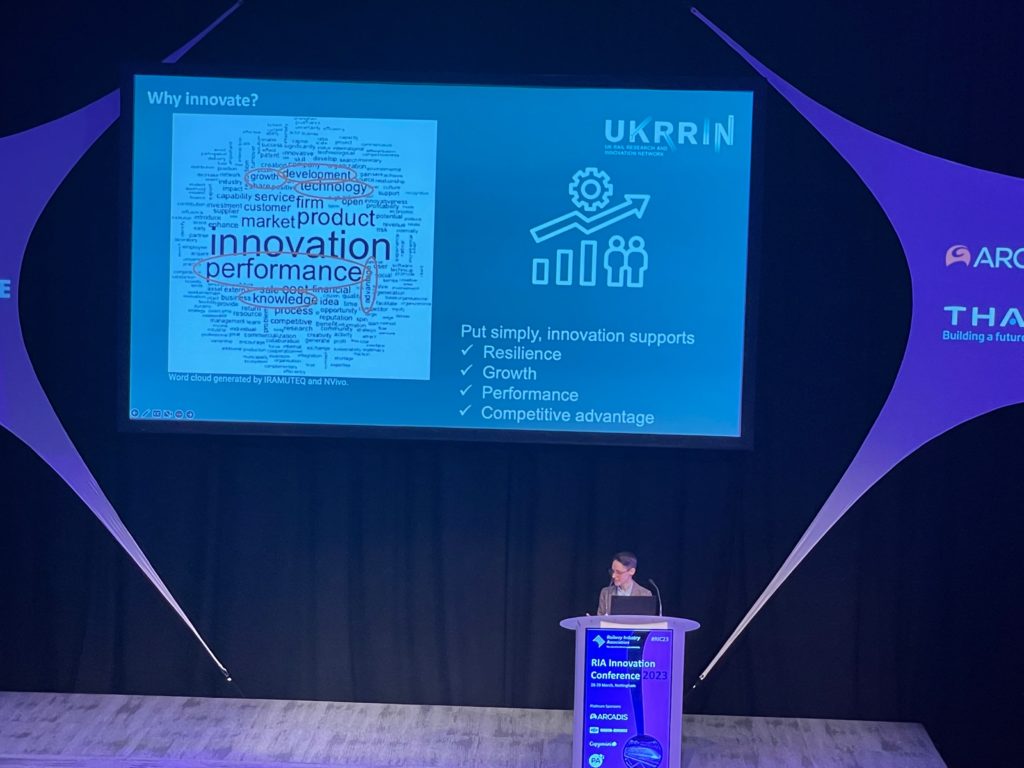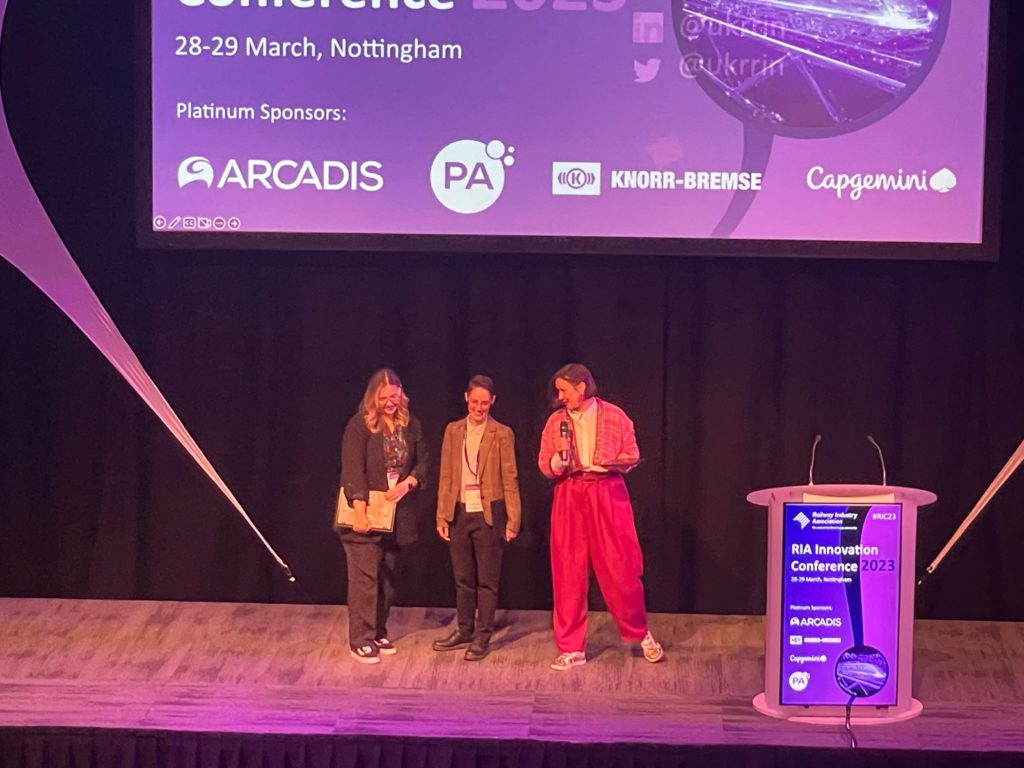
Dr Holly Foss, Director of Education provides her account on the RIA Innovation Conference 2023 and the takeaways from the event.
Last week I had the pleasure of attending the RIA Innovation conference alongside colleagues from BCRRE, Southampton, and Huddersfield as part of UKRRIN. Now in its 13th year, the RIA Innovation Conference is an annual conference bringing together the leaders, engineers, entrepreneurs, and professionals from across the industry.

We were joined by a range of colleagues from across the rail supply chain, including fellow strategic partner, Network Rail, sponsors, such as Arcadis, Capgemini, Knorr-Bremse, PA Consulting, and Thales, exhibitors encompassing One Big Circle, Camlin Rail, Phoenix Contact, and more, as well as speakers including East West Railway, Transport for Wales, and DB Cargo to name a few. The conference featured keynote speakers, tech talks, and exhibition spotlights, alongside networking, all centred upon making innovation happen in order to meet the key challenges facing industry today.
Innovation as creativity
The event’s exchanges and chance encounters also gave rise to many invaluable discussions around the nature of the UK rail industry today and the role of innovation therein. For me, it also got me to consider innovation as a concept more broadly. Critically bound up with creativity, innovation is complex, shifting, and hard to pin down – and it has to be by its very nature. Indeed, innovation is about the novel, the unknown, the yet to be developed. It is about meeting needs and wants in newer and better ways – whether cheaper, faster, more dynamic, more sustainable, more responsive, safer, easier, more fun, more accessible, more equitable or anything else. Innovation is thus fundamentally about an open and exciting exploration of ideas and concepts, or products, processes, opportunities, and, crucially, the ways to put these into practice.
Delivering innovation is more than the next idea: it is essentially, emphatically, and predominantly about people. Innovation is done by people, for people, and because of people. For innovation to happen successfully, we – those of us working today, and the future generations to come – must put people and be the people at the heart of innovation.
A people first approach
We know that people drive the rail industry, from the passengers using the services to those employed by, in, and because of the industry. However, within conversations about innovation, people as a central element are frequently omitted. For successful innovations – and their delivery – a people first approach is necessary. This requires both thinking about the people as customers of innovations (passengers, employers, businesses and organisations) and thinking about the people who are making the innovation happen (innovators, technicians and engineers, policy makers, and those employed throughout the sector). In the context of the global challenges faced by public transport accessibility, attractiveness, and sustainability, there are three essential factors for people-centric innovation: inclusion and diversity, skills and workforce, and time and space. We know that, although we’ve made great strides, diversity and inclusion remain pressing matters and we still have a long way to go. We also know that across the sector we are facing a significant skills shortage compounded by an aging workforce, a growing network, and changing capabilities and developing technologies. Finally, we know how challenging it can be to make space for innovation and creativity whilst managing multiple commitments and workload pressures
The role of Education
Education is about all of these aspects and more. It can be an inclusive, welcoming space for all to thrive and grow. It provides opportunities to develop essential knowledge and technical capabilities within specific subject areas and domains. Beyond this, it is about generating the time, the space(s), and the environment(s) to develop skills and foster opportunities to equip new people and more people with skills in the broadest possible sense.
By working on innovation through education, we can focus on attracting a broader range of individuals: individuals with different educational, class, social, international, interdisciplinary, and life experiences; individuals with different protected characteristics of gender, age, race, ethnicity, disability, sexuality, family and caring responsibilities, and religion; individuals with different views, priorities, expectations, and perspectives. This breadth affords a vital element for innovation: diversity of thought. Through education we can engender and encourage thought diversity for stronger innovation – by creating the space(s), advancing the skills, opening minds, embracing agility, willingness, and adaptability, and developing a wide range of people.
In an industry looking to innovate, an industry facing a shortage of diversity, of people, of capabilities and skills particularly in new and emerging areas, we can’t afford not to dedicate ourselves to innovation through people. It is education that provides the essential means for this.

For more about the RIA Innovation Conference click here.
For more about UKRRIN here.
For more about BCRRE’s educational programmes here.
